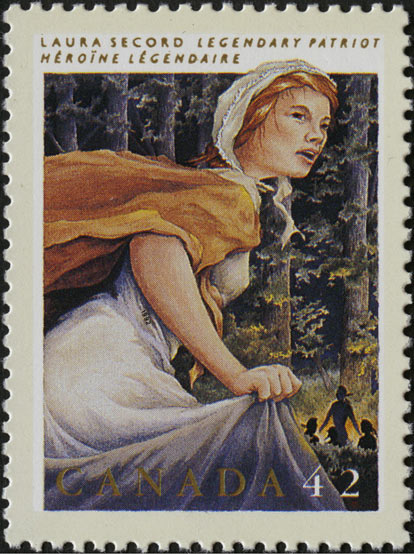By the middle of the 1800s, Ontario, along with most of British North America, had evolved beyond a simple pioneer society and was entering the early stages of industrialization. Concomitant with a concern to provide better educational opportunities for future generations, a wish arose to record the deeds of the past, including those of the War of 1812.
Americans, who invaded our country, burnt our towns, ravaged our fields, slaughtered our people and tried to place us under a foreign flag ... should [not] feel offended [by] an absolutely truthful narrative. New Brunswick historian James Hannay, 1905

© Canada Post Corporation
In 1855 a Toronto newspaper stressed the men and women “who could accurately inform us” of the past were “fast dying, if not already dead,” and urged that steps might be taken to record the early history of the province. In the late 1860s, the provincial government initiated measures to collect eyewitness accounts from the early settlers of the province, including survivors of the war. Among those who supported this initiative was William Hamilton Merritt, who possessed a distinguished wartime career as a young cavalry officer. Merritt and others urged Egerton Ryerson, the provincial superintendent of education and a leader of the Methodist church, to undertake this task, and in 1880 Ryerson published his seminal two-volume work on The Loyalists of America and Their Times.
By the time Ryerson wrote, the War of 1812 had taken on a distinctly heroic sheen in Canada. One Canadian author believed the very words “Eighteen Twelve” had “the virtue of an incantation” that “pulse and vibrate through the frame, summoning from the pregnant past memories of suffering and endurance and honourable exertion.” Ryerson was not much less restrained and left absolutely no doubt about who was responsible for the conflict:
At the darkest hour of that eventful contest, when the continent of Europe was drenched with the blood of nations, the Tyrant [Napoleon] had his feet upon their neck, and England alone stood erect, taxing her resources to the utmost and shedding her best blood for human freedom, the [Jefferson’s] Democratic party in the United States—the ever-anti-British party, the pro-slavery party—the party in the United States least subordinate to law and most inimical to liberty declared war against Britain and forthwith invaded Canada.
That invasion, Ryerson firmly emphasized, was defeated by the Canadians themselves. In an allusion to Leonidas at Thermopylae, he waxed lyrical about “the Spartan bands of Canadian Loyalist volunteers” who, “aided by a few hundred English soldiers . . . repelled the Persian thousands of democratic American invaders, and maintained the virgin soil of Canada unpolluted by the foot of the plundering invader.”
Ryerson set the tone for a generation of Canadian historians who generally painted a picture of an unoffending people who, summoned to arms by the tocsin of war, dropped their ploughs and grabbed their muskets to fight off the undisciplined and blue-coated republican rabble and preserve British North America for the empire. There was very little pretence about objectivity in the work of these authors—as James Hannay from New Brunswick expressed it in his 1905 history of the war:
No doubt it will be said by some critics that in this book I have been too severe on the Americans, who invaded our country, burnt our towns, ravaged our fields, slaughtered our people and tried to place us under a foreign flag [but] I see no reason why any American of the present day should feel offended [by] an absolutely truthful narrative.
The major theme in this literature was that loyalty to the Crown and self-sacrifice had prevailed in a fight against overwhelming odds.
Part of a series of articles titled The War of 1812 in Canadian Memory .
Last updated: April 2, 2015
